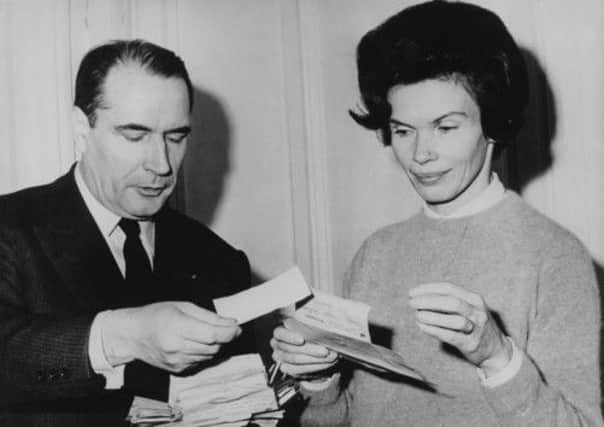Book reviews: Mitterrand, A Study in Ambiguity


Francois Mitterrand’s political career lasted for half a century. He was first, briefly, a minister in the government General de Gaulle formed after the Liberation in 1944; he was the first Socialist President of de Gaulle’s Fifth Republic from 1981-95, even though Guy Mollet, a Socialist Prime Minister of the Fourth Republic said that when he was in cabinets with him, “Mitterrand was never a Socialist.” Certainly his journey to the Elysée Palace was long and tortuous. It is thoroughly and sympathetically detailed by Philip Short in this biography which does full justice to Mitterrand’s life, both political and personal.
De Gaulle, his great rival, was a generation older. They had much in common. Both belonged to right-wing Catholic and monarchist families. Both were prisoners of war, de Gaulle in 1915, Mitterrand in 1940. Both tried to escape. De Gaulle failed, Mitterrand succeeded. In 1940, de Gaulle flew to England – an act which led to his condemnation as a traitor and deserter by the Vichy government. Mitterrand, after his escape, went to Vichy, where he was well thought of and decorated by Marshal Pétain. By this time however he was already in the Resistance, instrumental in forming a network of ex-POWs. Short gives a full account of his Resistance activities and shows – what some have doubted – that they were real, effective and dangerous. Like many in the internal Resistance, he resented de Gaulle’s assumption that his Free France movement was the real French opposition to the German Occupation.
Advertisement
Hide AdHe entered politics in 1945 as a member of a small right-of-centre party. But he had, as he often said, been deeply affected by his experiences as a POW. He had met people of a different, unprivileged background for the first time, and he had formed a commitment to ideas of social justice which were real, if also vague.
He served, effectively, in most of the short-lived governments of the Fourth Republic, but it was the Algerian war and de Gaulle’s return to power in 1958 by means of what Mitterrand denounced as a military coup, which moved him decisively to the Left, partly because there was nowhere else to go. He stood against de Gaulle in the presidential election of 1965, and, against all expectations, forced the General into a second ballot.
Thereafter, Mitterrand devoted himself to the unification of the Left. This required him to reach an accommodation with the Communist Party. He succeeded in bringing it into the fold – and then emasculated it. Arguably, this was his greatest achievement. He lost another presidential election in 1974 before winning seven years later. His party’s Socialist programme soon ran into trouble. Untroubled himself, he reversed it. In truth, apart from that commitment to social justice, he had neither interest in, nor understanding of, economics.
As President, he set himself two goals: to create a strong Europe, based on the Franco-German alliance, and to heal the divisions in France which had persisted between Left and Right, Vichy and the Resistance. He succeeded because he bridged that divide himself – no matter how much distrust he provoked on the Right.He made France a more normal, less violent society; he took the gun out of politics. Mitterrand himself belonged to a generation of politicians with experience of civil war, conspiracy, attempted military coups, assassinations and street violence. Though he had close links with Francophone Africa, he recognised that France’s future depended on its position of strength in Europe, and committed himself to ever-closer union. (A Chancellor of the Exchequer once told me that the single European currency would otherwise never come into being; “it’s just something got up to keep old Mitterrand happy”.)
Mitterrand was dominating and inscrutable, often referred to as a sphinx. He loved the game of politics, delighting in intrigue. This led some to think he was too clever by half and had no principles. He had denounced de Gaulle’s Fifth Republic as “a permanent coup d’état”, then found it suited him. The pre-war student from a monarchist family was comfortable in the role of an elected monarch. His Catholicism fell away, though he read the Bible assiduously. A politician to his fingertips, he had a life outside politics, devoted to literature and the countryside.
His personal life was complicated (unlike de Gaulle’s). He married his wife Danielle, who came from a secular, left-wing background, when she was very young, but was unfaithful to her from the start. The marriage, however, endured. Later, he kept another establishment, of which the French people were ignorant until very near the end of his life. Then he acknowledged his illegitimate daughter Mazarine, whom he adored; she was named after one of his political heroes, Cardinal Mazarin, effectively ruler of France for the long years of Louis XIV’s minority. If de Gaulle resembled le Roi Soleil – le grand monarque, Mitterrand was like the Cardinal, a spider weaving his web. Mazarin features in Robert Louis Stevenson’s favourite Dumas novel, Le Vicomte de Bragelonne, and Mitterrand’s own life and career seem, in comparison with politicians of today, to belong to the Dumas’ world of romance and intrigue.
Philip Short’s biography is as fascinating as its subject, and this is high praise.